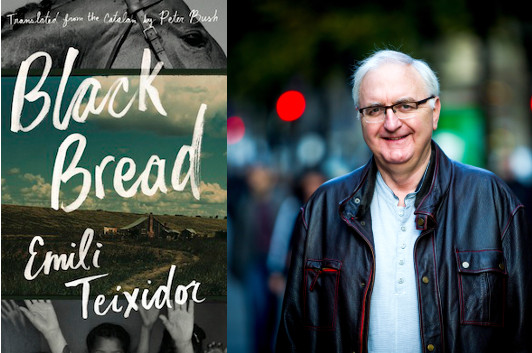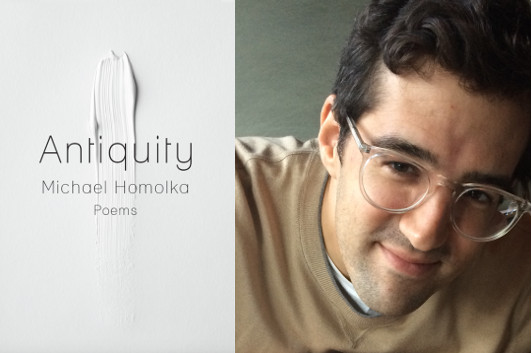Peter Bush’s No-Hope Sucklers

photo: courtesy Peter Bush
Black Bread is one of those novels that builds slowly, through the accrued detail of seemingly disconnected scenes… or, let’s say, a string of scenes where the narrative throughline is not immediately apparent to the reader. It attracted my attention because I know very little about Catalan culture beyond the fact of its existence, and I wanted to learn. And, too, I wanted to hear from its translator, Peter Bush—who wound up explaining how a novel about rural Catalonia stirred up memories of his own English childhood.
My very first memories are of a sow with the litter of piglets she’d just farrowed. Her sty was in our backyard and she was my first pet. On a Saturday morning in September, 1950, my elder sister walked me up to the Odeon to the kids’ session; when I came back, sections of the sow were hanging from our clothesline and the kitchen was full of blood and entrails. Cousin Ray the butcher had paid us a visit. (In post-war, still rationing Britain, it wasn’t unusual for people to keep pigs and chickens in their backyards, but by 1950, that era was coming to an end.)
Our domestic scene was gloomy for other reasons. My mother had arranged for us to move to a new council house with large gardens and light in a leafier part of town, from anonymous Seventh Avenue to a more optimistic Queen’s Road in the run up to a coronation, and my father had opposed this from the start. He didn’t want to leave the house my battling grandmother had forced out of the council when her husband, a village shepherd, fell ill one Christmas and was evicted along with his family from their tied-cottage by the Tory landowner. (As they bickered, I enjoyed the haslets, chitterlings, black puddings and pork-pies Ray had made from my pet.)
Many other memories, family stories and bits of our rural dialect and oral history kept flooding back as I translated Emili Teixidor’s Black Bread. Of course, pork and pig slaughtering have a different history in Catalunya and the whole of the Iberian Peninsula. The autumn pig slaughter is a time for festivities that are part pagan and part the legacy of an Inquisitional anti-Semitic, anti-Muslim tradition. But that’s not on the mind of the adolescents in Black Bread, as they hear about the deaths of those surplus to the litter, the runts, ‘the no-hope piglets, the no-hope sucklers’ who reach the tit too late: “Cry-baby and I shuddered when we heard those curious details, as if nature had also got it wrong with us, who through lack of tit and lack of parents were also destined to be abandoned and forgotten. No-hope children.”
11 September 2016 | in translation |
Michael Homolka’s Room Full of Rilke

photo:Tamara Arellano
Michael Homolka’s Antiquity is the recipient of the 2015 Kathryn A. Morton Prize for Poetry. (Longtime Beatrice readers may recognize the Morton Prize, as a previous winner, Jordan Zandi, shared his love for Szymborksa with us.) Homolka’s poems play with classical forms, sometimes reminding me of Stephen Burt, but always with an emotional tone that feels uniquely his own. In this guest essay, he talks about two poets who helped him find his voice.
Summer 2006. Bennington College MFA residency. A second story classroom with bugs and foliage out the window. Major Jackson finishes reading Rilke’s “You who never arrived” out loud to the group of ten students he and Timothy Liu are co-teaching, of which I am one:
And sometimes, in a shop, the mirrors
were still dizzy with your presence and, startled, gave back
my too-sudden image. Who knows? perhaps the same
bird echoed through both of us
yesterday, separate, in the evening…If it is said that poets traffic in silences, the silence in the room after that last word is equal parts deadly and transcendent. Major sums it up: “That’s a love poem, folks.”
I’m twenty-six years old at the time, ambitious to the point of hostility, jealous of every poet, jealous of every teacher. I’ve been working in book production in New York City for a few years; I go home every night and stay up until two or three in the morning revising drafts. So far I write only narrative poems. This June in Vermont marks the second of five residencies toward my degree.
2 September 2016 | poets on poets |

 Our Endless and Proper Work is my new book with Belt Publishing about starting (and sticking to) a productive writing practice.
Our Endless and Proper Work is my new book with Belt Publishing about starting (and sticking to) a productive writing practice. 
